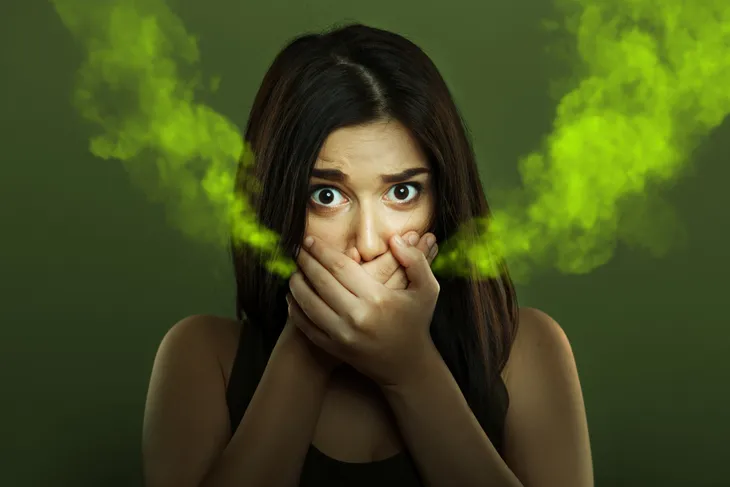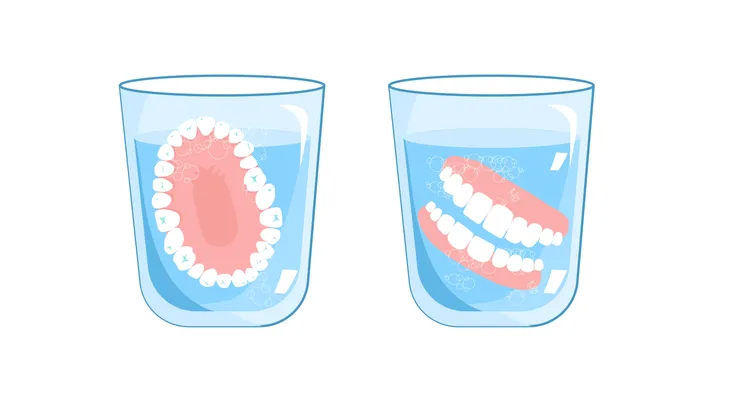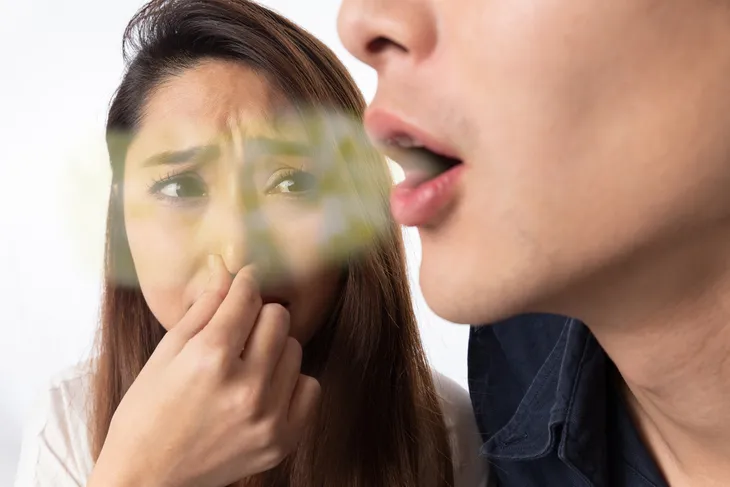- Halitosis is a form of chronic bad breath that can’t be fixed with mouthwash, brushing, or mints.
- In some cases, halitosis may be a symptom of another serious medical condition.
- There are numerous potential causes of halitosis, and many of them are treatable with simple lifestyle or behavior changes.
Bad breath isn’t that uncommon. In fact, it’s estimated that one in four people have bad breath. And that’s precisely why your TV is filled with mouthwash, gum, and solid electric toothbrush commercials. No one wants to live with bad breath!
What some people may not realize is that they may be dealing with a much more serious condition known as halitosis, also known as chronic bad breath. Halitosis can’t be fixed with some strong mouthwash and a daily mint. It’s a medical condition that can sometimes be a warning sign of a different medical issue.
If you suspect you may have halitosis, keep reading this complete guide on what halitosis is, the signs, symptoms, and causes, and how to treat it.
What Is Halitosis?
Halitosis is the medical term for a condition known as chronic bad breath. This condition occurs when a person’s breath is so bad it can’t be fixed with mouthwash, mints, or a good brushing. Halitosis shouldn’t be confused with morning breath or having bad breath after eating a type of food with a pungent smell. Instead, halitosis lingers all day long and is often the sign of bad oral hygiene or potentially is the side effect of another serious health condition.
If left untreated, halitosis can trigger anxiety, embarrassment, and stress when interacting with others. Luckily, treatment is possible.
What Are the Causes of Halitosis?
There are five leading causes of halitosis. The good news is that four out of five of these causes can be addressed easily with a lifestyle change. Once the change is made, the halitosis should disappear quite quickly.
It’s imperative to find the root cause of halitosis to fully treat the condition. Items like mouthwash, mints, and gums can offer temporary relief but are not a permanent solution because they don’t address the cause.
The five main causes of halitosis are:
1. Poor Oral Hygiene
Poor oral hygiene is the number one cause of halitosis. If you don’t regularly brush your teeth, floss, and see the dentist, you could have cavities and gum disease.
These oral problems create deep pockets in your mouth for bacteria to grow. Since these pockets are so deep that you cannot easily reach them when you brush, the bacteria are left to multiply. Over time, poor oral hygiene is highly likely to result in halitosis.
2. Improper Cleaning of Dentures or Retainers
If you don’t clean your dentures or retainers thoroughly, you could be reintroducing bacteria into your mouth. Dentures and retainers can collect bacteria, fungi, and food particles, all of which will breed bacteria. Even if you have a great flossing and brushing routine, all of that will become compromised when you reuse a less-than-clean retainer or denture.
Many people don’t even realize their retainers or dentures are dirty, as the bacteria particles are smaller than we can see. However, if your denture or retainer smells bad after cleaning it, it likely still contains traces of bacteria.
3. Smoking
All tobacco products, including cigarettes, cigars, smokeless tobacco, and snuff, can cause serious oral hygiene issues and health conditions. According to the Center for Disease Control and Prevention (CDC), smokers have double the risk of developing gum disease compared to nonsmokers.
Additionally, smokers are four times more likely to have advanced periodontal disease. Lastly, smokers tend to develop a naturally drier mouth. Dry mouth, gum disease, and periodontal disease can all increase a person’s risk of developing halitosis.
4. Dry Mouth
Having a chronic dry mouth is a medical condition known as xerostomia. There is a close link between people who have a constant dry mouth and halitosis. When your mouth doesn’t produce enough saliva, the mouth cannot clean itself and adequately remove food particles, leading to excessive bacteria growth and constant bad breath.
Xerostomia can be a side effect of medications, a health condition, a salivary gland disorder or even always breathing through your mouth instead of your nose.
5. Other Health Conditions
Lastly, chronic bad breath can be a symptom of another health condition. In some cases, the sudden appearance of chronic bad breath can be the first indication that something is wrong.
Some common health conditions that cause halitosis are:
- Respiratory infections (postnasal drip; chronic sinusitis; chronic bronchitis; nose, windpipe, or lung infections)
- Diabetes
- Gastrointestinal disorders
- Liver disorders
- Kidney disorders
In these situations, it can be harder to treat and cure halitosis as the root medical condition may not be as easy to treat.
 novak.elcic / Shutterstock
novak.elcic / ShutterstockSigns of Halitosis
The main sign of halitosis is chronic and extremely strong bad breath. Often, the problem is so bad that those closest to you will remark on it (hopefully, in a kind and gentle way).
Halitosis lasts all day (unlike morning breath) and will often worsen after drinking coffee, smoking, or eating strong-smelling foods like tuna, garlic, or aged cheeses. Lastly, halitosis may seem to temporarily get better with flossing and brushing, but a few hours later, the smell will return.
How to Prevent Halitosis
As mentioned earlier, the leading cause of halitosis is poor oral hygiene. So, one suggestion for prevention is to improve your dental care routine. Make sure you brush and floss at least twice a day. You should also be proactive as soon as you notice the halitosis.
This isn’t a condition that will necessarily go away on its own. In fact, it’s likely to continue and potentially worsen. As soon as you suspect you have halitosis, visit a doctor or a dentist to diagnose the root cause.
Treatment for Halitosis
Your treatment of halitosis will ultimately depend on the root cause. As we outlined above, four out of five of the major causes have a solution:
- Poor oral hygiene: Brush after you eat, floss twice a day, brush your tongue and go to checkups at the dentist at least twice a year.
- Improper cleaning of dentures/retainers: Purchase cleaning tablets that effectively clean your retainers or dentures to rid the majority of bacteria present.
- Tobacco products: Find a way to quit all tobacco products.
- Dry mouth: Talk to your doctor or dentist about how to address your dry mouth.
Do You Visit the Doctor or the Dentist for Halitosis?
Not sure if you should visit the doctor or the dentist for your suspected case of halitosis? Generally speaking, you should start with the dentist. Most root causes of halitosis are dental-related, so your dentist can be the one to help you address these issues.
If you visit the dentist and they determine that your halitosis is not dental-related, your next step will be to see a doctor. In this situation, a separate medical condition is likely causing the halitosis.
Living With Halitosis
It can feel embarrassing to have chronic bad breath, but it may also be comforting to know that the solution is likely in your control. A few changes, like improving your oral hygiene or giving up smoking, can offer a long-term fix to the problem.
The situation may feel more frustrating for the people who have halitosis due to another medical condition. However, carrying mouthwash and mints around can help as a short-term solution. Most importantly, it’s essential not to ignore your situation. Halitosis is a medical condition, and it’s crucial to find out its root cause.
 Shutterstock/fizkes
Shutterstock/fizkes












